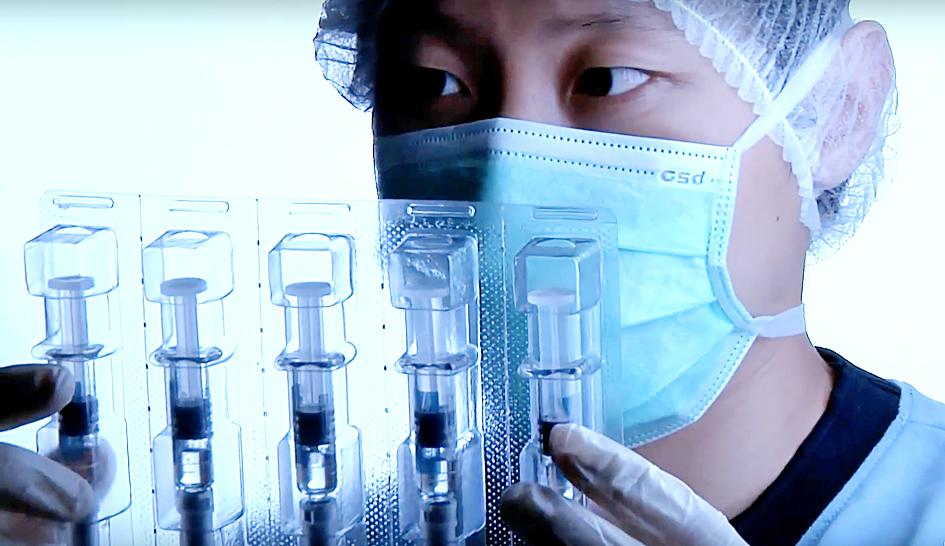Vaccine maker Adimmune Corp (國光生技) yesterday reported a net loss of NT$249 million (US$8.91 million) for last quarter, compared with a net profit of NT$1.24 billion in the fourth quarter of last year, due to rising research and development (R&D) expenses that involved a phase 1 clinical trial for its experimental vaccine against COVID-19.
That translates into a loss per share of NT$0.58, widening from minus-NT$0.05 a year earlier.
Revenue last quarter sank 98 percent year-on-year to NT$6.9 million due to a high comparison base last year, it said.

Photo courtesy of Adimmune Corp
Its revenue in January last year was boosted by robust sales of flu vaccines, it added.
Sales were also affected by the company installing new filling equipment at its plant in Taichung to expand its capacity, which affected its filling operations and delayed some projects, it said.
Adimmune said it is helping Shenzhen Techdow Pharmaceutical Co (天道醫藥), which focuses on low molecular weight heparin, fill enoxaparin sodium, but the work has been delayed to the end of this year with the Chinese firm’s consent.
Despite the losses last quarter, Adimmune is optimistic about the outlook for this year and expects its revenue to grow in the third quarter, when it completes installation of filling equipment and adds new production momentum, it said.
The company said its flu vaccines have been granted Halal certifications, which should help in marketing its products in Indonesia, Malaysia, Turkey, Singapore and Brunei.
It has applied for marketing approval of its flu vaccines in several Middle Eastern countries and is waiting for their review.

The New Taiwan dollar is on the verge of overtaking the yuan as Asia’s best carry-trade target given its lower risk of interest-rate and currency volatility. A strategy of borrowing the New Taiwan dollar to invest in higher-yielding alternatives has generated the second-highest return over the past month among Asian currencies behind the yuan, based on the Sharpe ratio that measures risk-adjusted relative returns. The New Taiwan dollar may soon replace its Chinese peer as the region’s favored carry trade tool, analysts say, citing Beijing’s efforts to support the yuan that can create wild swings in borrowing costs. In contrast,

Nvidia Corp’s demand for advanced packaging from Taiwan Semiconductor Manufacturing Co (TSMC, 台積電) remains strong though the kind of technology it needs is changing, Nvidia CEO Jensen Huang (黃仁勳) said yesterday, after he was asked whether the company was cutting orders. Nvidia’s most advanced artificial intelligence (AI) chip, Blackwell, consists of multiple chips glued together using a complex chip-on-wafer-on-substrate (CoWoS) advanced packaging technology offered by TSMC, Nvidia’s main contract chipmaker. “As we move into Blackwell, we will use largely CoWoS-L. Of course, we’re still manufacturing Hopper, and Hopper will use CowoS-S. We will also transition the CoWoS-S capacity to CoWos-L,” Huang said

VERTICAL INTEGRATION: The US fabless company’s acquisition of the data center manufacturer would not affect market competition, the Fair Trade Commission said The Fair Trade Commission has approved Advanced Micro Devices Inc’s (AMD) bid to fully acquire ZT International Group Inc for US$4.9 billion, saying it would not hamper market competition. As AMD is a fabless company that designs central processing units (CPUs) used in consumer electronics and servers, while ZT is a data center manufacturer, the vertical integration would not affect market competition, the commission said in a statement yesterday. ZT counts hyperscalers such as Microsoft Corp, Amazon.com Inc and Google among its major clients and plays a minor role in deciding the specifications of data centers, given the strong bargaining power of

TARIFF SURGE: The strong performance could be attributed to the growing artificial intelligence device market and mass orders ahead of potential US tariffs, analysts said The combined revenue of companies listed on the Taiwan Stock Exchange and the Taipei Exchange for the whole of last year totaled NT$44.66 trillion (US$1.35 trillion), up 12.8 percent year-on-year and hit a record high, data compiled by investment consulting firm CMoney showed on Saturday. The result came after listed firms reported a 23.92 percent annual increase in combined revenue for last month at NT$4.1 trillion, the second-highest for the month of December on record, and posted a 15.63 percent rise in combined revenue for the December quarter at NT$12.25 billion, the highest quarterly figure ever, the data showed. Analysts attributed the